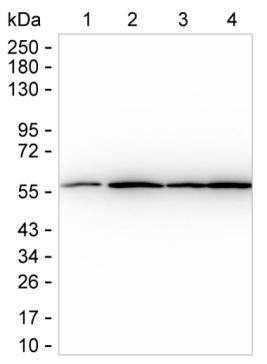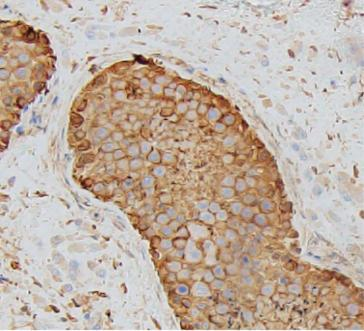

| WB | 咨询技术 | Human,Mouse,Rat |
| IF | 咨询技术 | Human,Mouse,Rat |
| IHC | 1/500 | Human,Mouse,Rat |
| ICC | 技术咨询 | Human,Mouse,Rat |
| FCM | 咨询技术 | Human,Mouse,Rat |
| Elisa | 咨询技术 | Human,Mouse,Rat |
| clone | 19C3 |
| Host/Isotype | Mouse IgG1 |
| Antibody Type | Primary antibody |
| Storage | Store at 4°C short term. Aliquot and store at -20°C long term. Avoid freeze/thaw cycles. |
| Species Reactivity | Human |
| Immunogen | Synthetic peptide within 40 aa of the C-terminus of human tubulin alpha-1A chain. |
| Formulation | Purified antibody in PBS with 0.05% sodium azide |
+ +
以下是关于α-Tubulin抗体的3篇代表性文献及其摘要概述:
---
1. **文献名称**:*Post-translational modifications of α-Tubulin in mitosis: Regulation and function*
**作者**:Janke, C., & Bulinski, J.C.
**摘要**:该综述总结了α-Tubulin的翻译后修饰(如乙酰化、去酪氨酸化)在有丝分裂中的调控机制及功能,重点讨论了相关抗体在检测修饰特异性微管动态中的应用。
---
2. **文献名称**:*Antibodies specific to α-Tubulin isoforms distinguish differentiation programs in human tissues*
**作者**:Gunning, P.W., et al.
**摘要**:研究利用α-Tubulin亚型特异性抗体,揭示了不同组织(如神经、肌肉)中微管异构体的差异表达,表明其在细胞分化和疾病中的潜在标志物作用。
---
3. **文献名称**:*Western Blotting: A routine method for verifying loading control consistency using α-Tubulin*
**作者**:Towbin, H., et al.
**摘要**:该技术论文提出将α-Tubulin抗体作为Western Blot内参的标准方法,验证其在样本均一化中的可靠性,并对比了不同实验条件下抗体的稳定性。
---
这些文献覆盖了α-Tubulin抗体在基础研究、疾病标记物筛选及实验技术标准化中的关键应用。如需具体实验方案或疾病相关研究,可进一步补充文献。
α-Tubulin is a core component of microtubules, dynamic cytoskeletal polymers essential for eukaryotic cell structure, division, motility, and intracellular transport. It belongs to the tubulin superfamily and forms heterodimers with β-tubulin, which assemble into protofilaments that constitute microtubules. α-Tubulin plays critical roles in mitosis, organelle positioning, and cell shape maintenance. Its expression is generally stable across cell types, making it a widely used loading control in Western blotting and other protein analysis techniques to normalize sample quantities.
Antibodies targeting α-tubulin are indispensable tools in cell biology research. They enable visualization of microtubule networks via immunofluorescence, aiding studies on cell cycle dynamics, cytoskeletal organization, and drug effects (e.g., microtubule-targeting chemotherapeutics). Commonly used clones like DM1A recognize conserved epitopes, ensuring cross-reactivity in human, mouse, rat, and other model organisms. These antibodies also detect post-translational modifications (e.g., acetylation, detyrosination) linked to microtubule stability and function.
In disease research, α-tubulin antibodies help investigate pathologies involving cytoskeletal defects, such as neurodegenerative disorders and cancer. Their reliability as housekeeping markers ensures accurate data interpretation in protein expression studies, underscoring their versatility in both basic and applied biomedical research.
×